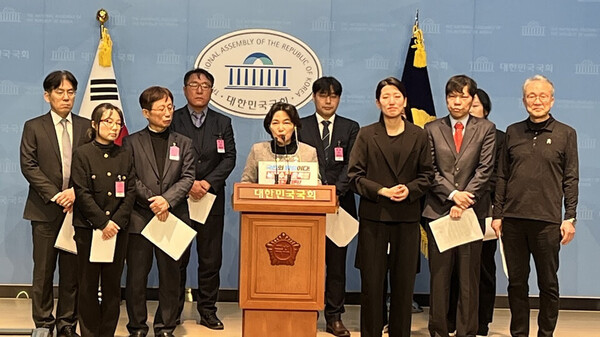Calls for recognizing type 1 diabetes as a disability have once again been raised in the National Assembly.
The Korean Diabetes Union (KDU) and Rep. Seo Mi-hwa of the Democratic Party of Korea held a news conference at the National Assembly last Friday to emphasize the need to recognize type 1 diabetes as a disability. It was the second official event for that purpose, following one in August of last year.

At the news conference, they released the results of the “Survey to Identify the Demand for Internal Disability Recognition of Pancreatic Insufficiency and Loss Disease” conducted since 2021.
The union conducted the study in collaboration with 15 related organizations, including the Korean Insulin Dependent Diabetes Association, the Korean Society of Pediatric Endocrinology, the Korean Diabetes Association, the Korean Endocrine Society, the Korean Medical Association, the Korean Pharmaceutical Association, and the Korean Society for the Study of Obesity.
The study surveyed 852 patients with type 1 diabetes and their families at 20 specialized medical institutions nationwide, including Seoul National University Hospital and Jeju National University Hospital.
Using the Diabetes Distress Scale, they were asked how much psychological burden and stress the symptoms of diabetes and the treatment process caused them in their daily lives (out of 5 points) and whether they agreed or disagreed with recognizing the disorder and why.
The results showed that 97.1 percent (827 respondents) favored recognizing the internal disability of pancreatic insufficiency and loss, while only 2.9 percent (25 respondents) were against it.
It indicated that people with type 1 diabetes have strong feelings of burden about the impact of the disease on their daily lives.
Patients expressed high agreement with statements such as, “Diabetes uses up too much of my mental and physical energy every day (4.48±0.79 points),” “I feel angry, depressed, and scared when I think about living with diabetes for the rest of my life (4.07±1.02),” and “I feel overwhelmed by the many demands or instructions I have to follow to manage my diabetes (3.83±1.08).
“Type 1 diabetes must be recognized as a disability considering the characteristics of the disease and the physical and social suffering of patients,” Rep. Seo said. “We now have an academic and logical basis for recognizing type 1 diabetes as a disability through the efforts of civil society organizations, various experts, and government agencies.”
Professor Kim Jae-hyun of the Department of Pediatric Endocrinology at Seoul National University Bundang Hospital, who led the study, said. “Type 1 diabetes is a disease that fits the World Health Organization's definition of 'disability. Clinical evidence has already confirmed that type 1 diabetes leads to irreversible body defects and damage, resulting in tremendous metabolic weakness and loss of function.”
Kim noted that in this study, Korean patients and families with type 1 diabetes perceive the daily suffering of the disease as overwhelming, comprehensive, and persistent.
“We found that an overwhelming majority of patients and families are in favor of recognizing internal disabilities such as type 1 diabetes,” Professor Kim added.
“The lack of social awareness of type 1 diabetes and its potential risks is significant, and patients still face discrimination,” said Koo Min-jung, a diabetes education nurse at Seoul National University Children's Hospital and president of the Korean Association of Diabetes Nursing Education.
Koo emphasized that recognizing it as a disorder will create a social consensus about the seriousness of type 1 diabetes, which will help patients receive better support in essential treatment, such as glycemic control.
“Strengthened institutional support will enable people with type 1 diabetes to live in a more stable environment, which will lead to their increased participation and role in society, contributing to national development in the long term,” Koo added.
The Korean Diabetes Union and experts plan to submit official data based on the study to the Ministry of Health and Welfare and turn it into an academic paper.
“The Korean Diabetes Union will play a broad role in making the government decide to register pancreatic disorders and set detailed criteria,” said Kim Kwang-hoon, head of the KDU and the Korean Insulin Dependent Diabetes Association.
Diabetes is not recognized as a disability in Korea, but some foreign countries provide legal protection.
In the United States, the Americans with Disabilities Act (ADA) includes diabetes as a disability and prohibits discrimination in employment, education, and public accommodations. The U.S. Equal Employment Opportunity Commission (EEOC) also recognizes diabetes as a disability and protects people with diabetes from seeking workplace accommodations.
Other countries, such as the United Kingdom and Australia, recognize diabetes as a disability and provide legal protections to prevent discrimination in everyday activities, employment, education, and more.
Related articles
- Realistic help needed for type 1 diabetics wanting to live a 'normal life'
- Korean doctors say obesity treatment matters—so why aren’t they prescribing?
- Type 1 diabetes patients face 1.8 times higher suicide risk than cancer patients
- Lilly Korea pushes to launch obesity drug Mounjaro as vial injection in Korea

